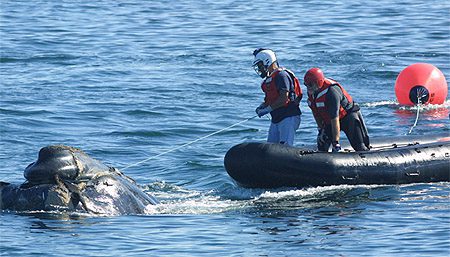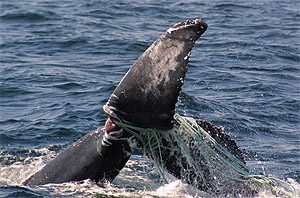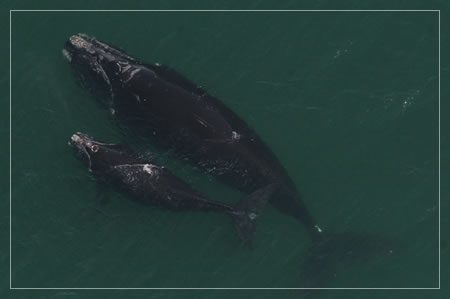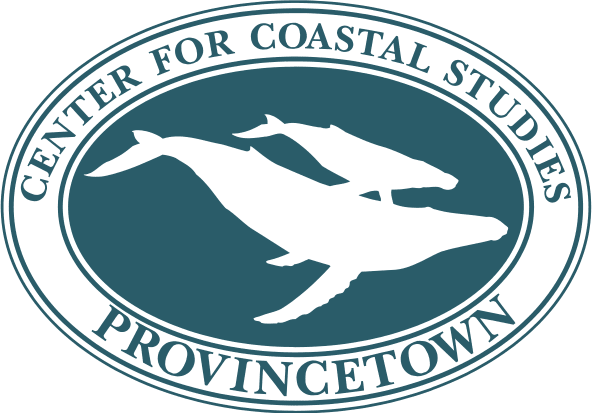Marine Animal Entanglement Response

Team towed by a right whale as entangling lines were removed
To report any live or dead marine animal entanglements, call 1-800-900-3622 or hail the USCG on VHF 16.
Since 1984, the Center for Coastal Studies has freed more than 200 large whales and other marine animals from life threatening entanglements, using techniques developed by Center staff. For many years, CCS was the only organization on the east coast of the United States to be federally authorized, by National Marine Fisheries Service, to disentangle large, free swimming whales, such as the humpback and the critically endangered North Atlantic right whale*. Over the years CCS has also disentangled other marine animals, like dolphins and porpoises, seals and sea turtles. If you want to help support these endeavors, please consider becoming a member.

Badly entangled flukes of a humpback whale
The principle disentanglement technique, a modification of an old whaling practice called kegging, involves attaching large floats, or kegs, to the gear entangling the animal. The floats add buoyancy and drag to the animal, making it difficult for it to dive, eventually tiring it out. The desired result is a relatively immobile animal that is more safe to cut free. The kegging system is designed for easy release should the rescue attempt fail.
Because of the endangered status of many of these animals, especially the northern right whale, where approximately 411 animals are believed to exist, the successful release of just one animal may have a profound effect on the recovery of the population as a whole. Over fifty-percent of known right whale mortalities have been attributed to either entanglements or ship strikes. While rescue techniques may help with species recovery, CCS recognizes that the best solution is a preventative one. CCS has consistently contributed research and knowledge to the effort of understanding and reducing the rate of entanglement of large whales.

A humpback breaches as the
rescue team readies a grapple
Starting in 1994, a Disentanglement Network was established in the U.S. and Canada to increase the scope of response to entangled marine animals. Coordinated by the Center and authorized and partially funded by the National Marine Fisheries Service in U.S. waters, the network is comprised of first response personnel that have extensive field experience with whales and small boat handling skills. Network members may assess, monitor, document and, in some cases, disentangle an animal. However, in situations where the animal is a candidate for rescue (dependent upon weather, resources, or complexity of the entanglement), the first responders may attach a satellite/VHF tag beacon to the entangled gear. The animal may then be tracked and rescued when conditions are more favorable.
In 1996, the Center was called upon to rescue a northern right whale entangled off the coast of Florida. This incident highlighted the need to expand the rescue program to include the entire east coast and offshore waters to a distance of one hundred nautical miles. Collaborating with the US Coast Guard and a number of other agencies, a “Rapid Response Program” was developed for the disentanglement of large, endangered whales normally not accessible to the Center’s efforts or outside the capability of network first responder teams. Using the resources of the network to outfit the rescue team and the resources of the Coast Guard to transport the Center’s primary rescue team quickly to the rescue site, we hope to increase our success in disentangling these critically endangered animals.
* The Center for Coastal Studies is federally-authorized to perform large whale disentanglement under the authority of Scientific Research and Enhancement Permit Number 18786, issued by the National Marine Fisheries Service and United States Fish and Wildlife Service under the authority of the Marine Mammal Protection Act.
CCS disentanglement work is supported by a grant from the National Marine Fisheries Service (NMFS) and the Massachusetts Division of Marine Fisheries (MA-DMF), and the Massachusetts Environmental Trust. Support for the MAER team also comes from the Grace W. Allsop Foundation, DJ & T Foundation, Max and Victoria Dreyfus Foundation, Mary P. Dolciani Halloran Foundation, Hermann Foundation, Island Foundation, MALLRD Foundation, Pegasus Foundation, Towle Ocean Conservation Foundation, Alexandra Rose Tozzi Memorial Foundation, G. Unger Vetlesen Foundation, and contributions from CCS members.
The narrative accounts and images depicted at this site are intended for educational purposes only. Mariners are urged to report sightings of entangled whales and sea turtles to the Coast Guard immediately and stand by the animal at a safe and legal distance. Attempts to disentangle any marine mammal without proper training and authority may be subject to prosecution and may result in injury to both animals and humans.

Our Work
Humpback Whale Research
Right Whale Research
Marine Animal Entanglement Response
Marine Geology Department
Water Quality Monitoring Program
Marine Fisheries Research
Seal Research
Shark Research
Marine Education
Interdisciplinary
Marine Debris and Plastics Program
Marine Policy Initiative
Cape Cod Climate Change Collaborative
Publications


